北师大版(2019)必修第二册Unit 6 The Admirable Lesson 2 History makers 课件 (21张ppt)
文档属性
| 名称 | 北师大版(2019)必修第二册Unit 6 The Admirable Lesson 2 History makers 课件 (21张ppt) | 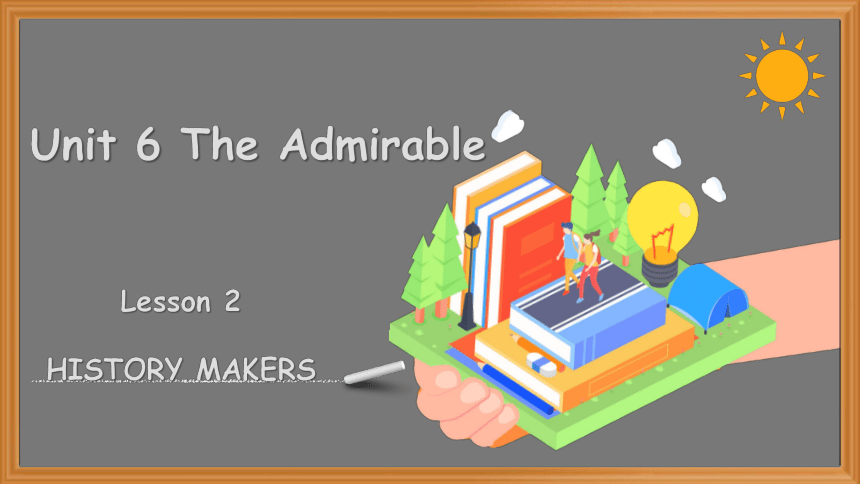 | |
| 格式 | zip | ||
| 文件大小 | 1.3MB | ||
| 资源类型 | 教案 | ||
| 版本资源 | 北师大版(2019) | ||
| 科目 | 英语 | ||
| 更新时间 | 2022-09-30 07:44:07 | ||
图片预览

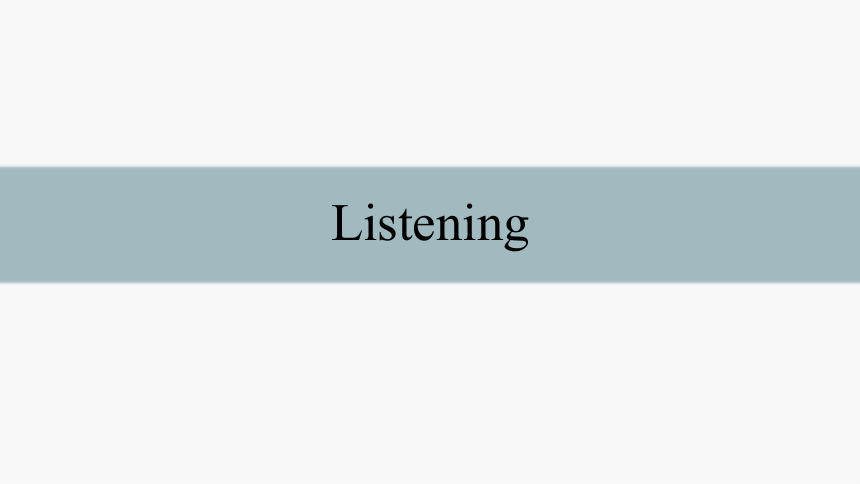
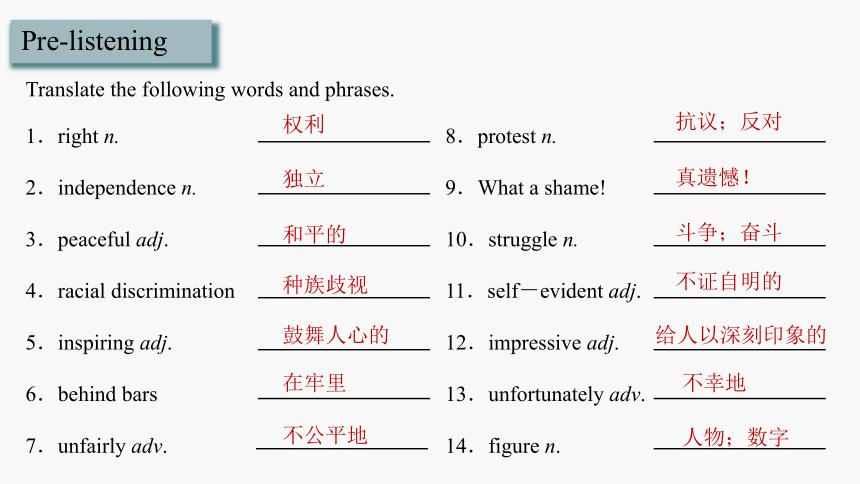
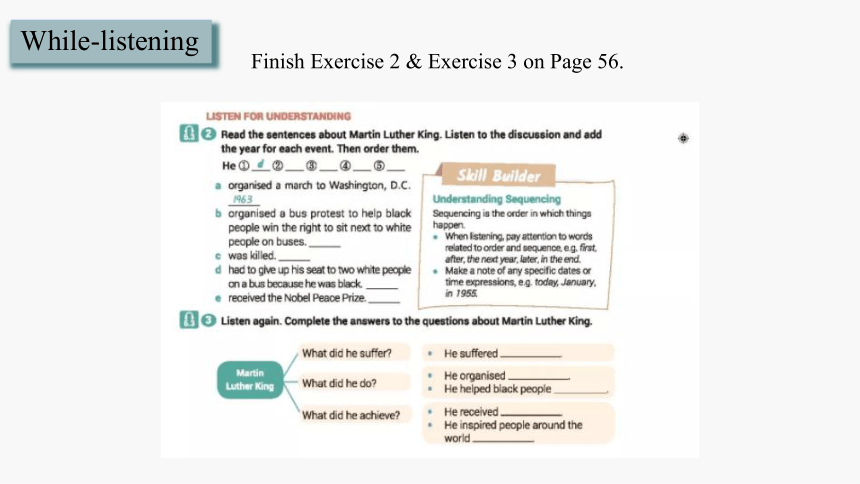

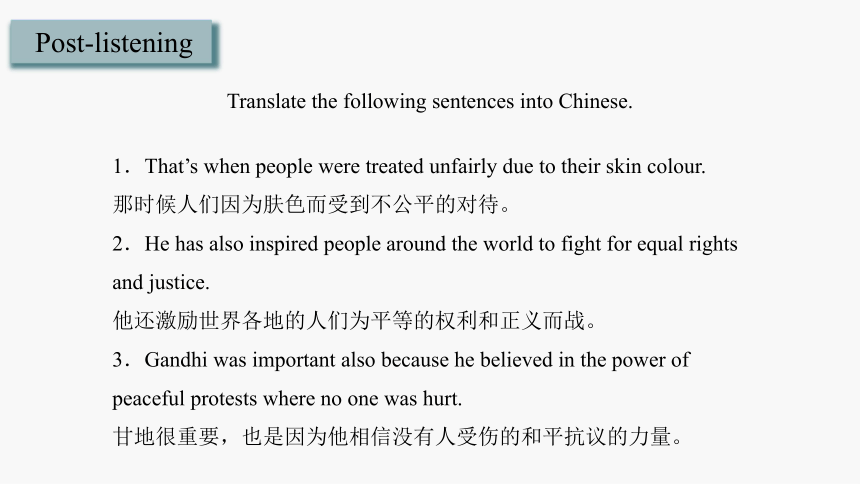
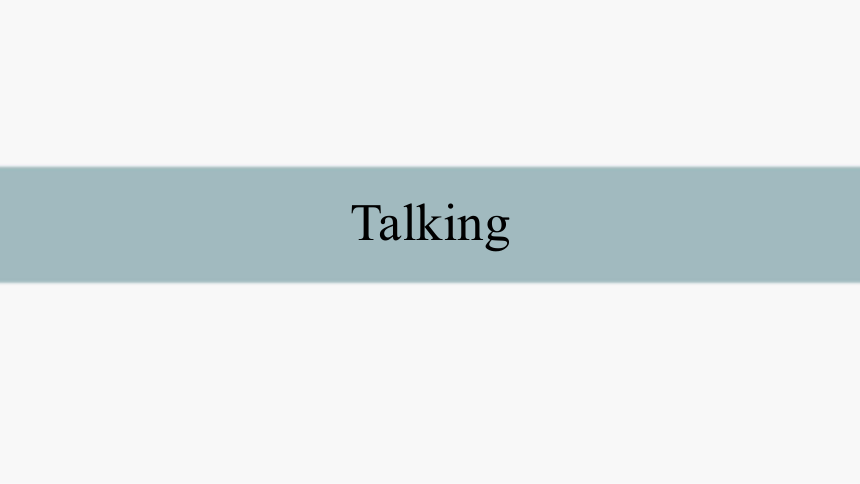
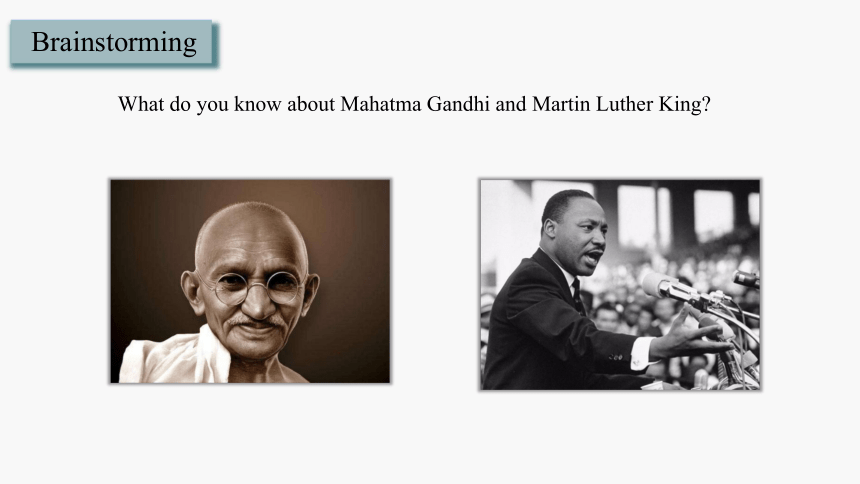
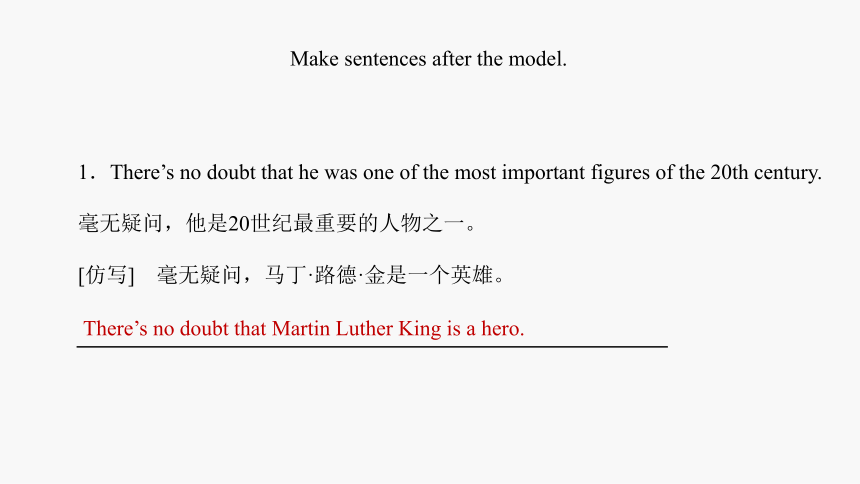
文档简介
(共21张PPT)
Unit 6 The Admirable
Lesson 2
HISTORY MAKERS
Listening
1.right n.
2.independence n.
3.peaceful adj.
4.racial discrimination
5.inspiring adj.
6.behind bars
7.unfairly adv.
Pre-listening
Translate the following words and phrases.
8.protest n.
9.What a shame!
10.struggle n.
11.self-evident adj.
12.impressive adj.
13.unfortunately adv.
14.figure n.
权利
独立
和平的
种族歧视
鼓舞人心的
在牢里
不公平地
抗议;反对
真遗憾!
斗争;奋斗
不证自明的
给人以深刻印象的
不幸地
人物;数字
While-listening
Finish Exercise 2 & Exercise 3 on Page 56.
Finish Exercise 5-6 & Exercise 7 on Page 57.
While-listening
Post-listening
Translate the following sentences into Chinese.
1.That’s when people were treated unfairly due to their skin colour.
那时候人们因为肤色而受到不公平的对待。
2.He has also inspired people around the world to fight for equal rights and justice.
他还激励世界各地的人们为平等的权利和正义而战。
3.Gandhi was important also because he believed in the power of peaceful protests where no one was hurt.
甘地很重要,也是因为他相信没有人受伤的和平抗议的力量。
Talking
Brainstorming
What do you know about Mahatma Gandhi and Martin Luther King
Make sentences after the model.
1.There’s no doubt that he was one of the most important figures of the 20th century.毫无疑问,他是20世纪最重要的人物之一。
[仿写] 毫无疑问,马丁·路德·金是一个英雄。
There’s no doubt that Martin Luther King is a hero.
Make sentences after the model.
2.I’m not sure about the exact date.我不确定确切的日期。
[仿写] 我对这个答案没把握,但我想它是正确的。
but I think it is right.
I’m not sure about the answer,
Make sentences after the model.
3.Actually, I don’t think Gandhi ever won a Nobel Peace Prize.
事实上,我认为甘地从未获得过诺贝尔和平奖。
[仿写] 我认为她抄我的作业不是个好主意。
for her to copy my homework.
I don’t think it is a good idea
知识拓展
表示确定和不确定的常用口语
1.Are you certain about that
你确定吗?
2.Are you quite sure about your success
你有把握成功吗?
3.I’m not sure that’s a good idea.
我不能肯定那是个好主意。
4.I suppose you have no doubt about that.
我想你对那件事毫无疑问吧。
知识拓展
表示确定和不确定的常用口语
5.I’ve no doubt of your ability.
我对你的能力没有怀疑。
6.I don’t know if they’ve got lost.
我不知道他们是否迷路了。
7.I’m quite sure things will improve.
我确信事情会好转的。
8.I’m not certain if he’s telling the truth.
我不能肯定他是否在说真话。
知识拓展
表示确定和不确定的常用口语
9.I couldn’t say for sure.
我不能肯定。
10.I can’t be certain of what time I left the office.
我不能肯定我是什么时候离开办公室的。
Language focus
1.judge vt.评价;判断 n. 法官;裁判 judgement n. 判断力;评价
I have a dream that my four little children will one day live in a nation where they will not be judged by the colour of their skin but by the content of their character...
我梦想有一天,我的四个孩子将在一个不是以他们的肤色,而是以他们的品格优劣来评判他们的国度里生活……
judge的用法和意义:
We shouldn’t judge a person by/from his appearance.
我们不应该根据外貌去判断一个人。
Judging from/by what he said, he must be an honest man.
根据他说的判断,他一定是个诚实的人。
①judge sb./sth. (to be)+adj./n. 认为某人/某物……
②judge... ... 根据……来判断……
③judging from/by 根据……来判断
from/by
【注意】judging from/by... 为独立成分,其中的judging用现在分词形式,其形式的选择不受上下文的影响。
2.respect vt. & n. 尊敬;敬佩 respected adj. 受人尊敬的
I really admire and respect him, and there’s no doubt that he was one of the most important figures of the 20th century.
我真的很佩服和尊重他,毫无疑问,他是20世纪最重要人物之一。
respect的用法和意义:
We respect him for his wide range of knowledge.他广博的知识让我们尊敬。
We have been told to show respect for our elders.我们被告知要尊重长者。
She finally gained the respect of her neighbors.她最终赢得了邻居的尊重。
①respect sb. sth. 因某事而尊重某人
②have/show respect ... 尊敬/敬重……
③gain/win/earn the respect ... 赢得……的尊重
for
for
of
3.pick out 挑选;辨别出;领会;理解
Pick out the right information for each of them.
选出符合他们各自的信息。
pick up 拾起;捡起,拿起;接人;(无意间)学会
pick on 挑剔;捉弄;选中
pick off 摘下
①He picked up his schoolbag and rushed out.他拿起书包冲了出去。
②Perhaps you can help me pick out a pair of jeans now, since you are an expert.也许你现在可以帮我挑一条牛仔裤,因为你是行家。
③When you’re a kid, the older kids sometimes pick on you.
当你是个孩子的时候,大一点的孩子有时会欺负你。
Unit 6 The Admirable
Lesson 2
HISTORY MAKERS
Listening
1.right n.
2.independence n.
3.peaceful adj.
4.racial discrimination
5.inspiring adj.
6.behind bars
7.unfairly adv.
Pre-listening
Translate the following words and phrases.
8.protest n.
9.What a shame!
10.struggle n.
11.self-evident adj.
12.impressive adj.
13.unfortunately adv.
14.figure n.
权利
独立
和平的
种族歧视
鼓舞人心的
在牢里
不公平地
抗议;反对
真遗憾!
斗争;奋斗
不证自明的
给人以深刻印象的
不幸地
人物;数字
While-listening
Finish Exercise 2 & Exercise 3 on Page 56.
Finish Exercise 5-6 & Exercise 7 on Page 57.
While-listening
Post-listening
Translate the following sentences into Chinese.
1.That’s when people were treated unfairly due to their skin colour.
那时候人们因为肤色而受到不公平的对待。
2.He has also inspired people around the world to fight for equal rights and justice.
他还激励世界各地的人们为平等的权利和正义而战。
3.Gandhi was important also because he believed in the power of peaceful protests where no one was hurt.
甘地很重要,也是因为他相信没有人受伤的和平抗议的力量。
Talking
Brainstorming
What do you know about Mahatma Gandhi and Martin Luther King
Make sentences after the model.
1.There’s no doubt that he was one of the most important figures of the 20th century.毫无疑问,他是20世纪最重要的人物之一。
[仿写] 毫无疑问,马丁·路德·金是一个英雄。
There’s no doubt that Martin Luther King is a hero.
Make sentences after the model.
2.I’m not sure about the exact date.我不确定确切的日期。
[仿写] 我对这个答案没把握,但我想它是正确的。
but I think it is right.
I’m not sure about the answer,
Make sentences after the model.
3.Actually, I don’t think Gandhi ever won a Nobel Peace Prize.
事实上,我认为甘地从未获得过诺贝尔和平奖。
[仿写] 我认为她抄我的作业不是个好主意。
for her to copy my homework.
I don’t think it is a good idea
知识拓展
表示确定和不确定的常用口语
1.Are you certain about that
你确定吗?
2.Are you quite sure about your success
你有把握成功吗?
3.I’m not sure that’s a good idea.
我不能肯定那是个好主意。
4.I suppose you have no doubt about that.
我想你对那件事毫无疑问吧。
知识拓展
表示确定和不确定的常用口语
5.I’ve no doubt of your ability.
我对你的能力没有怀疑。
6.I don’t know if they’ve got lost.
我不知道他们是否迷路了。
7.I’m quite sure things will improve.
我确信事情会好转的。
8.I’m not certain if he’s telling the truth.
我不能肯定他是否在说真话。
知识拓展
表示确定和不确定的常用口语
9.I couldn’t say for sure.
我不能肯定。
10.I can’t be certain of what time I left the office.
我不能肯定我是什么时候离开办公室的。
Language focus
1.judge vt.评价;判断 n. 法官;裁判 judgement n. 判断力;评价
I have a dream that my four little children will one day live in a nation where they will not be judged by the colour of their skin but by the content of their character...
我梦想有一天,我的四个孩子将在一个不是以他们的肤色,而是以他们的品格优劣来评判他们的国度里生活……
judge的用法和意义:
We shouldn’t judge a person by/from his appearance.
我们不应该根据外貌去判断一个人。
Judging from/by what he said, he must be an honest man.
根据他说的判断,他一定是个诚实的人。
①judge sb./sth. (to be)+adj./n. 认为某人/某物……
②judge... ... 根据……来判断……
③judging from/by 根据……来判断
from/by
【注意】judging from/by... 为独立成分,其中的judging用现在分词形式,其形式的选择不受上下文的影响。
2.respect vt. & n. 尊敬;敬佩 respected adj. 受人尊敬的
I really admire and respect him, and there’s no doubt that he was one of the most important figures of the 20th century.
我真的很佩服和尊重他,毫无疑问,他是20世纪最重要人物之一。
respect的用法和意义:
We respect him for his wide range of knowledge.他广博的知识让我们尊敬。
We have been told to show respect for our elders.我们被告知要尊重长者。
She finally gained the respect of her neighbors.她最终赢得了邻居的尊重。
①respect sb. sth. 因某事而尊重某人
②have/show respect ... 尊敬/敬重……
③gain/win/earn the respect ... 赢得……的尊重
for
for
of
3.pick out 挑选;辨别出;领会;理解
Pick out the right information for each of them.
选出符合他们各自的信息。
pick up 拾起;捡起,拿起;接人;(无意间)学会
pick on 挑剔;捉弄;选中
pick off 摘下
①He picked up his schoolbag and rushed out.他拿起书包冲了出去。
②Perhaps you can help me pick out a pair of jeans now, since you are an expert.也许你现在可以帮我挑一条牛仔裤,因为你是行家。
③When you’re a kid, the older kids sometimes pick on you.
当你是个孩子的时候,大一点的孩子有时会欺负你。
同课章节目录
- Unit 4 Information technology
- Lesson 1 Avatars
- Lesson 2 Apps
- Lesson 3 Internet and Friendships
- Unit 5 Humans and nature
- Lesson 1 A Sea Story
- Lesson 2 Professional Rescue Team
- Lesson 3 Race to the Pole
- Unit 6 The admirable
- Lesson 1 A Medical Pioneer
- Lesson 2 History Makers
- Lesson 3 The Superhero Behind Superman
